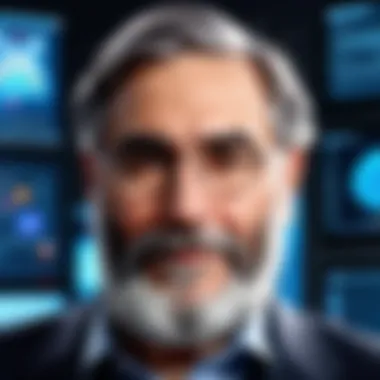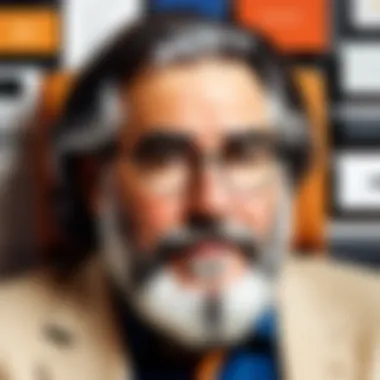Exploring the Legacy of Jonathan Sacks: A Thought Leader


Intro
Jonathan Sacks leaves behind an intricate legacy that resonates across various dimensions of society, particularly in morality and spirituality. His philosophical contributions offer valuable guidance amid a rapidly changing world. This article examines Sacks’ thoughts and actions which have illuminated paths of ethical understanding, interfaith dialogue, and societal cohesion.
In an era often marred by divisiveness and chaos, individuals like Jonathan Sacks provide insights that foster understanding. He discusses challenging moral dilemmas that plague contemporary society, offering perspectives rooted in Judaism yet applicable to broader audiences.
Examination of Influence
Sacks’ views speak not just to those within his faith group but also engage individuals from various backgrounds. Exploring the complexities he raised allows for academic growth along with moral clarification. This article details key endeavors and reflects on their relevance, aiming to deepen understanding of his substantial impact.
The Thought Leader's Perspective
In unraveling Sacks’ legacy, it's essential to dive into not only his writings but also his practical involvement in global discussions. Sacks emphasized the importance of interfaith dialogue as a mechanism for peace and understanding. His activity within this sphere is more than mere theoretical discourse; it aims to establish bridges among diverse communities.
"To be a Jew is to be a proud part of a long-standing moral tradition. Yet, it is one that invites others into deeper understanding despite differences."
The above sentiment encapsulates Sacks’ mission. It delineates the need to draw connections rather than deepen divides among communities.
Addressing Modern Ethical Dilemmas
Jonathan Sacks engaged deeply with moral questions that modern individuals face. His exploration of these issues often folded into broader themes:
- The rise of technological advancement and its effects on personal relationships.
- How secular society interacts with traditional values.
- The moral implications of political actions.
Each of these facets urges contemplation, nudging individuals towards actionable spirituality rather than passive belief.
Legacy in Scholarship
Sacks authored numerous books and essays discussing complex philosophical ideas paired with practicalities of life. Through this work, he encouraged thoughtful engagement with questions that provoke deeper comprehension across humanity.
Overall, Jonathan Sacks offered both moral clarity and holistic understanding within a complicated environment, making his legacy one that continues to inspire. His innovative perspectives reinforce the necessity of balanced reasoning and coherent moral foundations. Further exploration of his ideas unfolds pathways for understanding and navigating contemporary dilemmas.
Intro to Jonathan Sacks
Jonathan Sacks, a figure revered in the realms of philosophy and spirituality, marries tradition with contemporary discourse. As a former Chief Rabbi of the United Hebrew Congregations of the Commonwealth, his intellectual and ethical contributions continue to influence many today. This article explores his legacy, focusing particularly on his views related to Jewish thought in modern society, morality, and interfaith dialogue. Sacks served not just as a religious leader but also as a beacon of discourse on ethics in the face of a heavily secular world.
Biographical Overview
Jonathan Sacks was born on March 8, 1948, in London, England. His background is marked by a rich tapestry of Jewish faith and educational pursuit. Holistic learning characterized much of his early life. He attended King’s College London, where he studied philosophy, and later he pursued further studies at New College, Oxford. After earning his rabbinic ordination from the Jews’ College, he became an influential scholar and thinker. Sacks rose through various positions, eventually being appointed Chief Rabbi in 1991, a role he held for over two decades. His public addresses captured the attention of diverse audiences, extending well beyond Jewish circles.
Time and again, he showed how traditional beliefs could passionately engage with contemporary societal issues. His initiatives in interfaith dialogue stand out prominently; Sacks showed that encouraging understanding across different faiths was essential in an increasingly polarized world.
Significant Contributions to Jewish Thought
Sacks made several contributions that altered perspectives on Jewish thought. He authored more than twenty books that delve into topics ranging from religious philosophy to cultural analysis, always with a focus on how Judaism can respond to modern challenges. Books like "The Dignity of Difference" demonstrate his argument that diversity enriches human experience and should not be merely tolerated but celebrated.
His insightful lectures also contributed significantly to how Jewish thought is approached today. Sacks emphasized the importance of moral responsibility in a secular age. This led to new discussions around what it means to be Jewish in an increasingly complex global narrative. He engaged with both rich traditional contexts and pressing contemporary dilemmas, offering frameworks for ethical considerations and reflecting on human mortality and purpose.
Ultimately, Jonathan Sacks' significance extends beyond text. His exceptional ability to address sensitive topics with clarity encourages followers to think deeply and critically about their beliefs and the world around them. He provides a guiding light navigating the intersections of faith in modernity, allowing for a relatively new approach within Judaism.


"Freedom is not the absence of obligation, freedom is the pursuit of responsibility." — Jonathan Sacks
Intellectual Background and Education
Jonathan Sacks' intellectual background and education played a crucial role in shaping his thought and ideas. This section examines the foundational elements that influenced his philosophy and approach to leadership. Sacks' academic journey offered him the tools to engage deeply with both Jewish teachings and contemporary issues, allowing him to emerge as a noted voice in moral and spiritual discourse.
Academic Foundations
Jonathan Sacks received his education at prestigious institutions, including King's College London and the University of Cambridge, where he obtained a doctorate. His studies encompassed philosophy, theology, and the broad scope of Jewish learning. This diverse academic background laid the groundwork for his later work in exploring and promoting Jewish ethics. Significantly, Sacks' rigorous academic training allowed him to articulate complex ideas simply and accessibly, which made his thoughts resonate with wider audiences.
A deep engagement with classical texts influenced his outlook on tradition and modernity. Sacks embraced traditional Jewish teachings but coupled them with contemporary issues. This ability to bridge the past with the present was at the center of his influential essays and lectures. His goal was clear: to address the moral dilemmas facing society through a Jewish lens, thus contributing to greater understanding and interfaith dialogue.
Influences and Mentorships
Throughout his academic and professional life, Jonathan Sacks was profoundly influenced by various mentors and thinkers. These relationships informed his understanding of Jewish philosophy and the broader implications for humanity. Among notable influences were figures like Rabbi Abraham Isaac Kook and thinkers such as Michael Polanyi. These mentors encouraged critical thinking and facilitated Sacks’ exploration of contentious ideas within Jewish thought. Their insights provided him with perspectives that challenged norms and prompted deeper reflection.
Sacks was known not just as a scholar but as a practitioner of the ideas he espoused. He actively participated in various councils and organizations, fostering discussion and cooperation. The mentorship he received also instilled in him a commitment to build bridges between communities. His engagement in interfaith dialogues emphasized the importance of understanding diverse perspectives in an increasingly polarized world. This nurturing environment was instrumental in helping Sacks develop his skills as a communicator and leader.
"Knowledge without faith is not constructive; faith without knowledge is misplaced." – Jonathan Sacks
Sacks’ educational journey and the mentors he encountered played a pivotal role in crafting his voice. By combining deep knowledge with a commitment to societal well-being, he defined his path and established a significant legacy that resonates beyond his lifetime.
The Role of Rabbi in Modern Society
The role of Rabbi has evolved significantly over the years, adapting to the modern landscape while keeping the essence of Jewish tradition and theology alive. Ravi Jonathan Sacks exemplified this adaptation through his commitment to philosophical thought, ethical leadership, and interfaith dialogue. Delivering spiritual guidance within buzz-related contemporary issues, he sought to make Judaism relevant to modern life.
This article explores the importance of the Rabbi's role today and how it influences Jewish communities and beyond. Such roles include engaging the faithful, fostering ethical dialogue, and enhancing interreligious partnerships, making a robust case for why rabbinic voices should feature prominently in contemporary discussions.
Interfaith Dialogue Initiatives
Rabbi Sacks placed immense emphasis on interfaith dialogue initiatives, propelling discussions that transcend boundaries and barriers often present in religious communities. Understanding that modern society is intertwined with diverse worldviews, he advocated for respectful engagement with other faiths. This engagement was not merely about finding commonality; it was also about actively addressing moral dilemmas common to humanity.
By establishing platforms for discussion and encouraging collaborations between religious leaders from different backgrounds, Sacks demonstrated how effective dialogues can defuse tensions and build mutual respect. His work emphasized the importance of encouraging understanding through open dialogues that refine shared beliefs while respecting specific traditions. Sacks believed such initiatives are not just beneficial but essential for achieving a cohesive interplay in a multi-religious world. His relentless advocacy led to interfaith conferences and partnerships, which advanced the role of faith in society and promoted coexistence.
Moral Leadership in a Secular World
In our increasingly secular world, the moral voice of Rabbis becomes vitally essential. Jonathan Sacks presented moral leadership steadfastly grounded in Jewish texts, yet applicable to broader ethical debates, confronting contemporary issues with courage. His approach highlighted that morality must not remain confined to religious congregations. Instead, Sacks stressed that these values ought to influence societal norms.
As an advocate for justice, compassion, and truth, he positioned himself at the intersection between faith and ethics. He actively critiqued public policy and social issues from a moral standpoint that welcomes the tenets of Judaism while responsibly addressing the needs of society.
In essence, Sacks embodied the spirit of moral leadership in modernity, motivating both religious observers and secular audiences. His clarity in addressing societal tensions and moral decay challenged leaders everywhere to navigate ethical issues with integrity and ethical frameworks that uphold humanity.
To be a rabbi today means more than delivering sermons; it entails engaging in society with moral discernment, addressing contemporary challenges with sincerity and resolve.
By making such significant strides in both interfaith dialogue and moral discourse, Jonathan Sacks secured a prominent place for Rabbis in modern discussions, reaffirming their role as leaders who guide ethical conversations and foster healing among diverse groups.
Philosophical Perspectives
Philosophical perspectives offer a unique lens through which we can examine Jewish thought, particularly in the context of Jonathan Sacks's work. His ability to weave together complex ideas makes this area crucial for understanding his lasting impact. Sacks's approach to philosophy is marked by a commitment to grappling with profound questions of ethics, morality, and spirituality. These discussions are not merely academic; they resonate deeply within contemporary society. In an era increasingly dominated by secularism, Sacks's perspectives remain vital for enriching the moral discourse of our time.
Moral Philosophy and Ethics


Jonathan Sacks’s contributions to moral philosophy are rooted in timeless ideals yet are directly applicable to modern dilemmas. His perspective emphasizes that ethics is not a set of rules, but rather a framework for achieving the good life. He often advocated for the importance of individual responsibility and the collective implications of our ethical decisions.
Sacks frequently highlighted that moral choices define our humanity. His insights on character and virtue encourage individuals to embed faith and moral understanding in their lives. Some of his core ideas include:
- The significance of community: Our ethical behavior is shaped significantly by our communities, and moral integrity should extend into public action.
- Observance of dignity: Sacks viewed respect for human dignity as central to ethical living. This perspective underscores aspects of equality and justice.
- The role of narratives: He believed that stories can build ethical frameworks. By examining Jewish texts such as the Torah, we can draw lessons that inform our conduct in contemporary life.
These elements are foundational not just to Sacks’s philosophical thought but also to fostering societal harmony amid discord.
Spiritual Insights and Human Experience
In Sacks’s philosophy, spirituality and human experience are intricately linked. He did not see spirituality as a mere escapism; instead, it has the potential to ground us in reality. His interpretation of spirituality encapsulates a connection to God, each other, and ourselves. Sacks emphasized various dimensions of spiritual experience, such as:
- Reflection and mindfulness: He advocated for the need to stop and contemplate our lives, which enriches our connection to the world.
- Human suffering and transcendence: Understanding suffering is vital for spiritual growth, and Sacks often discussed how faith can provide strength during difficult times.
- Interconnectedness: Sacks articulated the idea that our lives, thoughts, and actions influence a broader narrative, suggesting that spirituality can enhance our empathy towards others.
Sacks’s teachings promote the understanding that spiritual experiences can guide moral choices and enrich human interactions. Aligning our actions with spiritual principles offers a framework for living authentically.
Jonathan Sacks’ view that ethical considerations enlighten spiritual insights illustrates his profound commitment to bridging philosophy with daily experiences. Both realms coexist harmoniously, ensuring that spiritual insight remains connected to real-world effects.
Both moral philosophy and spirituality underpin Jonathan Sacks's profound legacy. They create avenues for understanding our responsibilities toward one another and enrich our engagement within the global narrative. In a world craving profound insights and moral clarity, his work continues to emerge as a beacon.
Writing and Public Engagement
Writing and public engagement are pivotal elements in understanding Jonathan Sacks' contributions. His ability to articulate complex philosophical and moral concepts in an accessible manner has broad-reaching implications. Sacks used writing as a vehicle to reach diverse audiences, going beyond the confines of academia and effectively engaging the public in moral discourse.
Through books, articles, and essays, he expressed concerns about the future of Judaism and offered insights into contemporary issues. His writings reflect careful thought and extensive research, infused with passion. By engaging with modern culture, he bridged classical Jewish teachings with current societal challenges, allowing newcomers to grasp significant ideas that resonate today.
The impact of his public engagement is noticeable in several ways:
- Accessibility of Ideas: Writing facilitates the understanding of complex moral and philosophical issues, making them attainable to a broader audience.
- Promotion of Dialogue: Successful public engagement often involves discourse between different thoughts. Sacks harnessed this by advocating for interfaith dialogue, emphasizing the importance of listening and learning from one another.
- Cultural Relevance: Engaging with public themes helps frame traditional thought within the context of contemporary issues, preserving relevance in times of rapid change.
Notable Publications and Works
Jonathan Sacks authored numerous significant books, among which “To Heal a Fractured World” and “The Dignity of Difference” are essential. Each publication reflects his profound commitment to ethics, faith, and resilience amidst uncertainty. His works provide logical yet spiritual guidance, influencing not just Jewish readers but anyone committed to understanding life’s moral dimensions.
Key works include:
- “I Am Jewish”: A look at Jewish identity that argues for inclusivity and understanding in diversity.
- “The Chief Rabbi's Haggadah”: An innovative text that blends contemporary insights with traditional interpretations.
- “Not in God’s Name”: Examines violence in the name of religion and promotes dialogue against hatred.
These writings collectively underline the importance of Sacks' legacy in articulating the relationship between faith, culture, and ethics. His contributions illuminate critical aspects of Jewish life and spirituality while extending meaningful reflections on universal human values.
Impact of TED Talks and Public Speaking
Jonathan Sacks transformed his public speaking talents into influence and authority through high-profile TED Talks and various speeches. This method of dissemination allowed him to interface effectively with various demographics, extending his reach beyond conventional media.
His TED Talks emphasized themes such as community, understanding, and morality, embedding a sense of urgency around critical conversations. In addition, his articulate delivery and thoughtful ideas not only captivated audiences but also spurred critical thinking about the human condition.
The influence of Sacks’ public speaking underscores how personal interactions and storytelling shape the perceptions of ethics and spirituality. Such engagements ignite discussions that impact both individual and collective cognition.
His approach emphasized modern relevance while encouraging moral reflection.


Overall, Jonathan Sacks' writing and public engagement worked in harmony to cultivate a legacy that emphasized connection and understanding in a complex world. His ability to navigate both the written word and personal interaction made his work impactful, timeless, and important for future generations seeking guidance in navigating moral and ethical dilemmas.
Critiques and Controversies
Critiques and controversies surrounding Jonathan Sacks play an important role in understanding his legacy. As a prominent thinker, he addressed modern ethical challenges and Jewish identity, which sparked debates. Engaging with different perspectives can deepen insights and encourage further discussions on these subjects.
Acknowledging these critiques helps highlight the, sometimes polarizing responses to his ideas. This section will explore some critiques raised about Sacks and the significance of these discussions.
Responses to Criticism
Jonathan Sacks faced a range of criticism throughout his career, often stemming from differing interpretations of Judaism and ethics. While deployin intellectual rigor, he showcased his willingness to engage with critics thoughtfully. Whenever challenged he normally emphasized dialogue and understanding over conflict.
A notable example can be seen in his writings on interfaith relations. Critics argued that Sacks sometimes converged too closely with ideological positions different from traditional Jewish thought. Sacks acknowledged discomfort with various perspectives but remained dedicated to constructive dialogue. By focusing on common values, he offered a pathway to unify diverse beliefs. This tactical approach not only allowed him to address objections but also enabled him to solidify his role as a mediator in contentious conversations.
When rejecting simplistic categorizations, Sacks sought to evoke responsibility within modern ethical landscapes, challenging individuals to consider their roles in society. His engagements do trace back to some recurring responses, reiterating his stance that moral discourse requires the recognition of complexity and nuance.
Debates on Contemporary Judaism
Debates about Jonathan Sacks' interpretation of contemporary Judaism also hinge on his central ideas regarding identity, spirituality, and morality. Sacks frequently examined the tension between tradition and modernity. He questioned how Judaism could maintain its essence feeding everyday reality. This reflection inevitably brought forth diverse opinions.
Some critics perceived his syncretism—that is the attempt to harmonize various traditions—as diluting core Jewish values. These critiques raised pertinent queries about the evolving identity of Judaism in secular societies. Scholars and practitioners debated if Sacks proposed new ways of engaging with faith or if he endangered it entirely.
Moreover, his perspectives on Israeli politics and global anti-Semitism brought additional discourse. Terms like Jewish identity and safety became points of contention. Some stakeholders reflected on how Sacks advocated for pluralism. The challenge was how to vary perspectives within coherent Jewish identity.
A return to core concepts of Jewish tradition emerged amidst these discussions. Critics drew boundaries that indicated there were discussions around heritage, belief and practices which could sometimes create friction. As has been shown with Sacks' legacy, addressing such debates is pivotal as they aid understanding the future mindset of Judaism.
Engaging with critiques provides valuable insights. From criticism arise opportunities for growth and clearer definitions of identity and belief.
Legacy and Influence
The legacy of Jonathan Sacks resonates with profound significance in today's sociopolitical landscape. He navigated complex issues such as morality, community relations, and faith, bringing uniquely Jewish perspectives into broader conversations. His voice emerged as a soothing force in tumultuous times, offering wisdom that commanded respect not just from Jewish communities but also from diverse audiences worldwide. This section will explore the lasting influence of Sacks through two significant lenses: his impact on the Jewish community and the insights he imparted to future generations of thinkers.
Sacks’ Lasting Impact on Jewish Community
Sacks profoundly transformed the modern Jewish community through his multifaceted approach as a leader. He encouraged a return to Jewish values and traditions, bridging gaps formed by modernity. His teachings motivated a revival in Jewish pride, inviting the younger generation to explore their heritage with renewed enthusiasm. Sacks emphasized conversation and connection across all facets of Jewish life.
His engagement with moral discussion highlighted the ethics embedded in Jewish law. He demanded that synagogues and communities confront the challenges of modernity while maintaining their core values. This engagement manifested in several key initiatives:
- Emphasizing Jewish Ethics: Sacks’ writings, such as
The End
The conclusion serves as a pivotal element in this article, encapsulating Jonathan Sacks' profound impact on contemporary thought and moral discourse. It is essential to reflect on his enduring contributions. Sacks navigated complex intersection of ethics, spirituality, and societal challenge with remarkable clarity.
Reflections on Sacks’ Teachings
Jonathan Sacks' teachings offer a rich canvas for exploration, focusing on the intricacies of morality and faith. He emphasized the importance of dialogue, advocating for understanding and respect in diverse communities. One of his notable arguments centered on the notion that true leadership in any society involves the courage to challenge preconceived notions and to foster genuine discussions on ethical concerns. His literature often highlights the significance of storytelling in the Jewish tradition, presenting narratives that carry moral weight.
The insights gained from Sacks’ works extend beyond religious boundaries. They resonate with anyone grappling with ethical questions in pluralistic societies. As he articulated, "In a world where we celebrate difference, we must also find the bonds that unite us." These reflections encourage readers to ponder not just their beliefs, but also how they interact with differing perspectives in a globalized society.
The Relevance of Sacks’ Work Today
Even after his passing, the ideas championed by Jonathan Sacks remain remarkably relevant. Modern society faces unprecedented ethical dilemmas, from technological advancement to social fragmentation. Sacks’ philosophy presents tools and frameworks to navigate through uncomfortable discussions while emphasizing a collective responsibility in moral spaces.
His analysis of human connection is particularly striking in today's digital age, where true interpersonal relationships can feel thin. Sacks pointedly argued that isolation breeds social issues. This pandemic effect underlines his thoughts: the need for connection is as strong today as ever.
In summary, Sacks' legacy combines timeless ethical questions and frameworks that remain vital for today's challenges. By promoting dialogue and emotional intelligence, his work encourages enduring reflection on how society shapes individual perspectives and behaviors. These teachings can often remind readers that how they choose to engage with others defines societal evolution against modern complexities.







